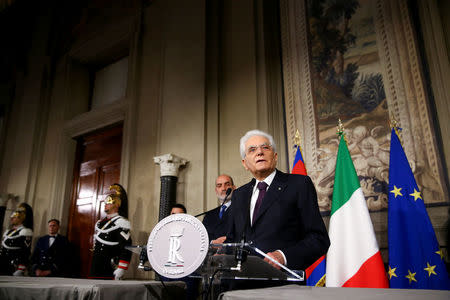Reaction to political crisis in Italy

MILAN (Reuters) - Italy's president is expected to ask a former International Monetary Fund official on Monday to head a stopgap government amidst political and constitutional turmoil, with early elections looking inevitable.
President Sergio Mattarella has called in Carlo Cottarelli after two anti-establishment parties angrily abandoned plans to form a coalition after the head of state vetoed their choice of eurosceptic economist Paolo Savona as economy minister.
Below are some reactions to the latest developments:
HOLGER SCHMIEDING, CHIEF ECONOMIST, BERENBERG
"Even if the immediate risk of having a eurosceptic finance minister in Italy has now been at least postponed, Italian uncertainties will continue to weigh heavily on sentiment in Italy and -- to a lesser extent -- its euro zone neighbours in coming months.
"In new elections, the radicals will likely rail even more loudly than before against Italy's pro-European 'establishment' and an alleged 'German hegemony' exercised through the rulebook of the single currency. As the will to accept -- or not accept -- the rules of the euro was Mattarella's key issue upon rejecting Savona, the radicals -- and notably the League -- may fight a new campaign on a more explicit anti-euro platform.
"In the March 4 vote, concerns about immigration had played a bigger role than European issues. Especially the League may frame a new election as a de facto referendum on Italy's role in Europe."
SILVIA ARDAGNA, ANALYST, GOLDMAN SACHS
"We expect that a caretaker government would not win a confidence vote in parliament and that new elections could take place as early as October.
"We believe political uncertainty will remain elevated. On the one hand, a government that could have been perceived by financial markets as calling into question the participation of Italy in the European Union and its membership in the euro area has not been formed. On the other hand, potential new elections, most likely in October, would unlikely be seen as a positive development for the Italian economy either."
GILLES GUIBOUT, PORTFOLIO MANAGER AT AXA INVESTMENT MANAGERS, PARIS
"It's another moment of uncertainty. It is not clear to me how much the 5-Star Movement and the League are still aligned. From what I understand (League leader Matteo) Salvini was not interested in getting a government going.
"As expected from the beginning Italy will return to vote. A rebound is possible in the short term since there won't be a government, but if there is (a rebound), I don't believe it will last.
"Now we need to understand what could be the outcome of a new vote, but what's clear is that Europe will be at the centre of the debate of the next campaign."
MARK ZANDI, CHIEF ECONOMIST AT MOODY'S ANALYTICS, in an interview with La Stampa newspaper
"The latest developments add fresh uncertainty and complexity to Italy's political situation. I expect investors to be very nervous and confused. Bond yields will rise, and volatility too. It will be a chaotic situation.
"As days go by however, (investors) may see President (Sergio) Mattarella's choice as positive, because it put a brake on the M5S-League coalition, denying them the eurosceptic Treasury minister they wanted."
(Reporting by Milan and London newsroom; Editing by Catherine Evans)

